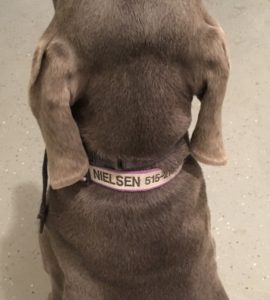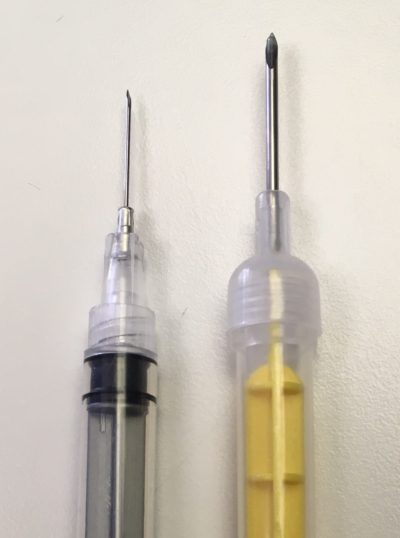As you can imagine, one of the toughest things about being a vet is saying “no” to stray pets. We get a lot of calls about pets found or lost each week at Winterset Veterinary Center. These calls are extremely frustrating for those that have lost or found the pet and also for our practice. Madison County does not have a shelter that accepts dogs and cats that have been found or people that have decided they can no longer care for the pet and need a place to surrender them to. People find animals along the roads of Madison County. Being concerned for their safety, they pick them up and make a call to ask where they can drop them off for safe keeping until owners can be found. I am sorry to say these people have very few options for these dogs and cats. This presents a lot of issues for all parties involved. Therefore, I want to make some suggestions to all pet owners that will possibly ensure your pet, if lost, can get home as quickly as possible.
First of all, we as veterinarians cannot tell you why your pet ran away. Pets do crazy things sometimes. Even if they have never run and they are 8 years of age they can still decide on the spur of the moment to run away. Having a pet neutered or spayed can help reduce the incidence of running but they run for other reasons as well. Maybe they have found an alternative food source on an adventure or they have found other animals or people to play with. Maybe they are trying to follow you and find where you go every day. Perhaps they have a fear of noises or thunderstorms. Maybe they took off after a wild animal or bird. Perhaps they are just following their nose and tracking who knows what. Whatever the reason is, you must be prepared for it.
 IDENTIFICATION TAGS AND COLLARS
IDENTIFICATION TAGS AND COLLARS
Every pet should have a tag or collar with the owners name and phone number at the very least. A rabies tag is not appropriate identification. A rabies tag is proof that a vaccination was given at some time. It does have a clinic name where the vaccination was given but often when dogs or cats are found it is after business hours and there is no way to track that information until the clinic opens for business again. Large dogs often lose dangling tags, so consider a collar with your information embroidered on the collar or a tag that rivets to the collar. A company that does a great job on collars is www.orvis.com. They have a large number of collar options and the embroidery is very easy to read even from a distance. I once got a phone call from a service man who had come to our home to deliver something. I asked him how he got my number and he said from your dog’s collar. I have used these collars since 2007 and have never been disappointed. They even have collars that reflect light to help keep pets safer at night.
PHOTOS OF YOUR PET(S)
It is important to have a picture of your pet that would be easy to access in the event your pet has been lost. We have found that social media has been a great way to alert people to a lost or found pet. The picture should be age appropriate and close enough to see markings on the pet. If you find a pet and can take a picture and post it, that is extremely helpful. Attempt to see if it is a male or female. Telling where the pet was found can be beneficial. If you find a pet along the road and are traveling out of the area it is best not to take that pet with you. The owners will not be looking for their pet in another city or state. There is a website called www.iowapetalert.com where pets can be listed as lost or found hoping to reunite them with their owners.
MICROCHIPS
This is a must do for all pets. It is not that expensive and when a pet is microchipped the reunion happens much more quickly. As of today, the chips do not have a tracking device on them. Maybe in the future the technology will allow this. So how does the microchip work?

Many microchips today are 15 digit universal chips. They are placed under the skin at the shoulder blade with a syringe very similar to a vaccination. It can be done in the exam room with the pet awake. Many chips have non-migration properties today. This is extremely important. Earlier chips moved under the skin and therefore made it difficult to find them when scanned. The universal chips can be read in any country around the world. If your pet has a microchip, make certain you know the microchip number and manufacturer.
Most companies encourage the pet owner to register the microchip number. At Winterset Veterinary Center we purchase pre-registered microchips. This allows us to enter all the contact information and set up an account with Home Again the same day we place the chip. The American Animal Hospital Association (AAHA) started a website called www.petmicrochiplookup.org. If the company your microchip came from does not cooperate with this website, I would encourage you to call them and ask why. A microchip is of little use to you if your contact information is not available quickly to the person who found your pet. The above website allows you to put the microchip number into a search box and they will then give you a number to call where more information can be found. Your personal information and that of your pet is protected. It is also important to know that the microchip information cannot be put into anyone else’s name without your signature. This is important in the case of a theft. Most microchips do come with a tag to put on the pet indicating they have a microchip, but as with any tag there are times it is missing or unable to be read. That is why it is so important to scan any pet that has been found to make certain they do not have a chip. We have heard some amazing stories of pets reunited with their owners even after many years have passed or miles have been traveled.
If you know your pets microchip number but do not know if you have registered it or not, here is a test you can do to find out. Go to the above website and type in your microchip number. It then will give you a number to call for further information. When you make that phone call you should discover that your personal information is connected to your pet and that all the information is correct. If that is not the case, you need to ask how to update the information so in the event your pet is lost there will be fewer delays. Most pets adopted from shelters are now microchipped. Many breeders microchip puppies prior selling them.
Losing a pet is one of the most devastating situations for a family. Doing these three things can help you be reunited with your pet in the event they leave home unexpectedly, because it can happen to you!